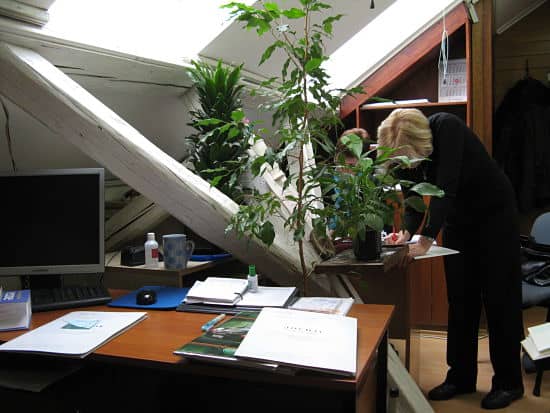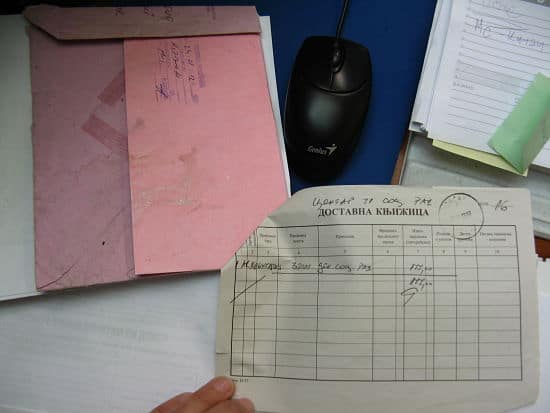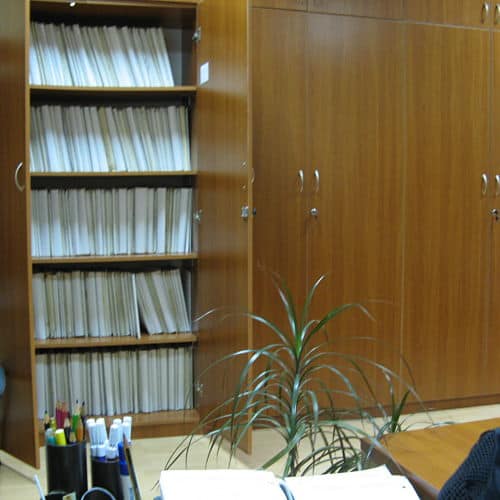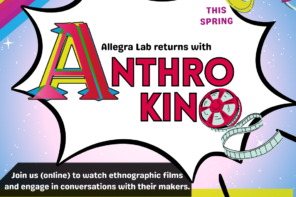This ain’t New York
As a contributor to the recently published edited volume Stategraphy: Towards a relational anthropology of the state (Thelen, Vetters, and Benda-Beckmann 2017), Allegra invited me to reflect on our approach. Rereading therefore some older drafts of my dissertation on state relations in Serbia (Thiemann 2016), I re-experienced my first interview attempt in July 2009 at a Centre of Social Work in Moravac, central Serbia.[i] The Director of the Centre who met me and my research assistant[ii] was an elegant and strict, university educated social worker with 26 years of professional experience. She appeared utterly puzzled about our interest in the social security situation of Gornje and Donje Selo, where I had started fieldwork. “This is not New York, it is not very exciting!” she exclaimed. Then she elaborated:
“Well, Gornje and Donje Selo aren’t special villages. They do not excel, neither in prosperity nor poverty. That is some average of the Municipality, nothing special (…). There are users (ima korisnika), but not that you would say, ‘eh there are really poor people’ or ‘there are no poor’, that is everywhere some average, on the town level and in the environs. That’s it!”
An average situation was precisely what I wanted to study. In retrospect, I enjoy pondering the meaning of her words. User (korisnik) is a technical term of the social law in former Yugoslavia.[iii] A korisnik receives social security protection services (usluge socialne zaštite), including social aid, adoption, fostering etc. Social services are portrayed as a common resource pool accessed by members of a community. I consider the term more accurate than the English “customer”, because it highlights interactions in a redistributive state system that is unlike market exchange. But increasingly, local libertarian readings have highlighted the parallel to “drug user” (korisnik droge), picking on and pathologizing the assumed “dependency” dimension of social benefits modelled after charities and alms.[iv] While such asymmetrical connotations seem unintended when the term was coined during socialism, they resonated when the director linked the users to poor people.

Two social workers discussing a case (photo by author)
I had set out to study the state through the lens of social security, a multi-layered anthropological concept that encompasses the ideal, institutional, interactional and idiosyncratic social organization of social (in)security effects (Benda-Beckmann, Benda-Beckmann, and Marks 2000). Our problems to convey the complexity of social security to the Director were confounded by the underwhelming effect of the mainly qualitative methods I intended to use. They came across as unscientific and potentially distracting her staff from its duties. Exclaiming that we now “knew everything”, the interview was over within 15 minutes. It took me six months, a dozen short contacts, and pleading on different scales of statecraft, before I was allowed uninterrupted research access.[v]
During one of my short visits to the Centre, I met case worker Ana, until 2008 the “field worker” (terenski radnik, or street worker) of both villages. She stated that Donje Selo (with ca. 1000 inhabitants) was an “agricultural village” with “only one or two cases”. Gornje Selo (with approximately 650 inhabitants), because of its higher age structure and a population of week-end house owners attracted by its spa, had “four to five cases”. Thus, less than 1 per cent of the rural population used social services, in times of a global financial crisis and after repeated waves of accumulation by dispossession since the 1990s.
Even such snippets of discourse contain fascinating material. First, people receiving social benefits were ascribed an identity through reifying their status as a “social case” (socijalni slučaj), i.e. a file worked on by the social work bureaucracy. I traced this labelling in Serbian social law back to the 1970s, from where it had “migrated” into common parlance. Colloquially, the high stigma attached to being a “social” (socijala), meant that talking about social protection became dangerously associated with destitution. This was driven home to me during a narrative-biographical interview with my friendly neighbour Kamila, a householder and member of the voluntary self-government of the Local Council (Mesna Zajednica). Upon mentioning social security (part of the title of my dissertation), the interview foundered. Kamila insisted “I do reject to see my family as a social”. Advisedly then, throughout my fieldwork on the welfare state and care relations – as I now more positively connote my research interests – I mostly relied on participant observation and open-ended, informal interviews.

Social work files under preparation (photo by author)
How can fieldwork snippets inform a relational anthropology of this moving target – the state? In Anthropology, the state is often put squarely on one side of dichotomous libertarian debates, which champion the “pluckiness of little people” against the “system” hell-bent on dominating them, as Stef Jansen (2015) has argued. Such dichotomies hark back to a long Western history of debates about the public and the private enshrined in Roman law. This law was codified during the Roman Empire, when sovereign Caesars dominated, – an aspect equally fascinating and repulsive for Foucault or Agamben. But Roman law shrouded itself in then obsolete republican language. The concepts of the res publica were derived from the Athenian polis’ ideal of a community of virtuous, solidary citizens. Political sociologist Jeff Weintraub (1997) uses this contaminated genealogy to motivate his saga of the muddled struggles and spill-overs between at least four models of public-private dichotomies: the liberal-economist, republican-virtue, anthropological sociability, and the feminist divide. And anthropologists found more models the world over. For instance, an Asian-Melanesian “negative indirect action” government based on local gardening models is said to differ from Mediterranean “positive direct action” government associated with the “pastoral” sovereign (Haudricourt 1962, cited in Descola 2014, § 19).
Without awareness of such complexity, each attempt to define the state remains seriously flawed.
Our relational inspiration in stategraphy has been not to define the state ourselves. Instead, we follow the “boundary work”, i.e. the local social negotiations of the possible (but not necessary) public-private divide in situated encounters. To observe how social actors exchange discourses and practices about the state or government – in Hindi the term sarka denotes both (Mathur 2016) – means to observe how the boundary is reconfigured. Boundary work is performed in the majority of empirical cases between street-level bureaucrats (Lipsky 1980) like Serbian social workers or Local Councillors in relation to other state agents and the population. Street-level bureaucrats do not only mediate professional values, laws, bureaucratic procedures, and a pluralism of other norms, they also translate and therefore make policy. From a situated knowledge perspective, street-level bureaucrats are sometimes called “interface bureaucrats” (Bierschenk and Olivier de Sardan 2014). From our relational perspective, it might be equally illuminating to call them “boundary workers”. The effects of their negotiations stand in relation to their embeddedness (positional access to resources), to local modalities of statecraft (instituted practices informed by images of the state) and to the strategic selectivity of the state (seen as a multiscalar field of force favouring certain modalities over others).[vi]
Much more needs to be said about the complex spatial and historical dimensions of statehood. In my book project Caring States: A relational anthropology of local politics, infrastructures, and the welfare state in Serbia (n.d.) I propose a new perspective on the “local state” as a grounded, not bounded meshwork of the diverse scales of the state that have an effect on a locality. What did I find out about the social work profession in central Serbia’s local state? The “case” had travelled over even broader swaths of space and time than I initially imagined. It had been first introduced in Serbia in the 1950s from the USA as part of the Marshall plan. Half a century later, history repeated itself, when UK’s Development Agency DFID and its proxy “Oxford Policy Management” reintroduced case work as a new solution in recently re-peripheralised Serbia.
Development reform can repeat itself as a tragedy, or as a farce.
In the process of retranslation, Serbian social work was re-bureaucratised and thereby “hardened” a boundary that appeared increasingly indifferent, arbitrary and nonresponsive to outsiders – including to the ethnographer at the beginning. The widening divide was partly bridged by a proliferating vernacular humanitarianism (Brković 2017). The special irony was that from a local radical social work position, already the Yugoslav tradition was too bureaucratic (Stubbs and Maglajlić 2012, 178).
Donje and Gornje Selo then, while not New York, proved a spell-binding puzzle piece for a relational anthropology of the state.
References
Benda-Beckmann, Franz von, Keebet von Benda-Beckmann, and Hans Marks, eds. 2000. Coping with Insecurity: An ‘Underall’ Perspective on Social Security in the Third World. 2nd ed. Yogjakarta: Pustaka Pelajar and Focaal.
Bierschenk, Thomas, and Jean-Pierre Olivier de Sardan. 2014. States at Work: Dynamics of African Bureaucracies. Leiden: Brill.
Brković, Čarna. 2017. ‘Introduction: Vernacular #Humanitarianisms’. Allegra. 25 September 2017. https://allegralaboratory.net/vernacular-humanitarianisms/.
Descola, Philippe. 2014. ‘Anthropology of Nature: Inaugural Lecture Delivered on Thursday 29 March 2001’. In . Leçons Inaugurales. Paris: Collège de France. http://books.openedition.org/cdf/3631.
Jansen, Stef. 2015. Yearnings in the Meantime: ‘Normal Lives’ and the State in a Sarajevo Apartment Complex. New York: Berghahn.
Lipsky, Michael. 1980. Street-Level Bureaucracy: Dilemmas of the Individual in Public Services. New York: Russell Sage Foundation.
Mathur, Nayanika. 2016. Paper Tiger: Law, Bureaucracy and the Developmental State in Himalayan India. Delhi, India: Cambridge University Press.
Stubbs, Paul, and Reima Ana Maglajlić. 2012. ‘Negotiating the Transnational Politics of Social Work in Post-Conflict and Transition Contexts: Reflections from South-East Europe’. British Journal of Social Work 42 (6):1174–1191.
Thelen, Tatjana, Andre Thiemann, and Duška Roth. 2017. ‘6. State Kinning and Kinning the State in Serbian Elder Care Programs’. In Stategraphy. Towards a Relational Anthropology of the State, edited by Tatjana Thelen, Larissa Vetters, and Keebet von Benda-Beckmann.
Thelen, Tatjana, Larissa Vetters, and Keebet von Benda-Beckmann, eds. 2017. Stategraphy: Toward a Relational Anthropology of the State. Studies in Social Analysis 4. New York: Berghahn Books.
Thiemann, Andre. 2016. ‘State Relations: Local State and Social Security in Central Serbia’. PhD thesis, Halle: Martin Luther Universität Halle-Wittenberg.
Weintraub, Jeff, ed. 1997. Public and Private in Thought and Practice: Perspectives on a Grand Dichotomy. Chicago: University of Chicago Press.
[i] Toponyms and actors have been anonymized. Field work lasted for 18 months between 2009 and 2013.
[ii] M.A. Aleksandar Repedžić, now director of the Museum of Anthropology at Majdanpek, Serbia.
[iii] David Henig mentioned the “user”-figure in his paper on Bosnia-Herzegovina’s soup kitchens at the panel “Translating social policy in the semi-periphery”, IUAES Dubrovnik (2016), convened by Čarna Brković and Paul Stubbs.
[iv] I thank Marek Mikuš for his insightful discussion during the follow-up workshop at the Institute for East-European Studies (IOS) in Regensburg, 2017.
[v] The Centre in the neighboring town proved more forthcoming. My material for our co-edited chapter “State Kinning and Kinning the State” in the Stategraphy volume was collected there (Thelen, Thiemann, and Roth 2017). In the chapter, we analyze how material state effects and visceral state affects in state-initiated and funded elder care relations are discursively erased and replaced by practices and enactments of new kinship.
[vi] While the first three “axes of research” – embeddedness, boundary work, modalities – are developed in the theory chapter of Stategraphy, strategic selectivity is my analytical addition on power relations.









